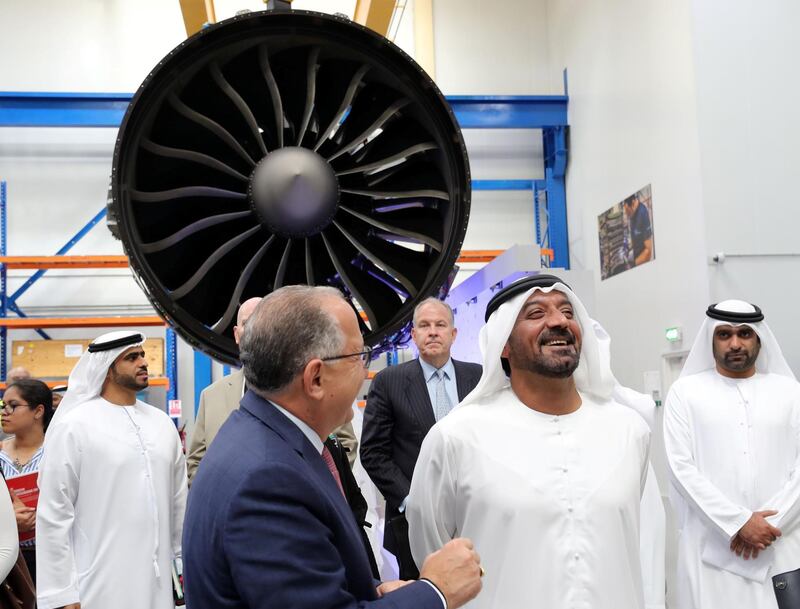Emirates airline, the world's biggest long-haul carrier, expects a stronger performance in its current fiscal year than the last, as it benefits from a reversal in US President Donald Trump's electronics ban and closer ties with low-cost sister service flydubai.
Emirates is also seeking to raise $1.1 billion in an Islamic bond sale, with the proceeds to be used partially for aircraft financing, chairman of Emirates Group Sheikh Ahmed bin Saeed said on the sidelines of a GE Aviation event in Dubai on Tuesday. The airline expects an increase in annual earnings for the fiscal year ending March 31 compared with the previous year.
“It’s going to be better than last year in general,” Sheikh Ahmed said, declining to provide details of the growth.
The projected increase comes after Emirates, which operates the world's largest fleet of wide body aircraft, saw profits plunge 82 percent in the 2016-17 fiscal year. The carrier's performance for the first six months of 2017-18 financial year was a marked improvement with profits soaring 111 per cent to Dh1.7bn.
The rise in profitability came as the airline implemented a number of measures which included a reduction in its payroll and charging for advance seat selection to boost revenues.
Factors that have weighed on earnings in the last financial year have begun to ease with the lifting of a ban on electronics on US flights and travel restrictions on passengers from certain Middle East countries to the US. The airline is working to ramp up some of the routes it had scaled back following the restrictions.
Demand on US routes is “much better now,” Sheikh Ahmed said.
__________
Read more:
[ Emirates Group net profit soars 77% in first half to Dh2.3 billion ]
[ Emirates-Flydubai codeshare deepens choice for customers, boosts carrier gains ]
__________
Emirates’ move to forge closer links with discount carrier flydubai last year, in the first stirrings of regional airline consolidation in response to economic headwinds, will also help improve its bottom line, analysts said.
"The new network structure between Emirates and flydubai has the potential to improve yields," said Mark Martin, head of aviation company Martin Consulting in Dubai. Flydubai's regional flights will help fill Emirates' jets, particularly as African, CIS and South East Asian markets have a need for long-haul connectivity, he said.
"I am very pleased with the cooperation between the two," Sheikh Ahmed said. "It's beyond our expectations and we'll see it very much closer to the summer schedule."
Next year, both airlines will have to contend with repairs on one of the two runways at their home base in Dubai International Airport for 45 days. The southern runway will be closed from April 16 to May 30 in 2019, resulting in reduced capacity and airlines scaling back their operations.
"The biggest cut will be on Emirates and flydubai," Sheikh Ahmed told reporters at the official opening of US conglomerate GE's aircraft engine repair facility close to Dubai's second hub at Al Maktoum International Airport. All operators at Dubai International are being informed in advance in order for schedules to be adjusted, he added.
GE Aviation is expanding its regional presence with a second engine repair and maintenance operations facility in the UAE, where it will support all local carriers including Emirates, flydubai, Air Arabia and Etihad Airways. It did not disclose the value of the investment. The On-Wing Support Centre at Dubai South Aviation District spans 1,500 square metres and is entirely owned and run by GE. Emirates has been operating the other facility in conjunction with GE since 2013.
Around 1,000 GE-manufactured engines power 400 aircraft in the Middle East, the company's global chief executive John Flannery said on Monday. The firm's regional expansion comes as the UAE is ramping up efforts to grow its aviation manufacturing and maintenance, repair and operations (MRO) industries, centred within the Dubai South free zone.
GE is using new manufacturing technologies including 3D-printing to develop a new turbo propeller aircraft engine over the next two years, Mr Flannery said. The 3D-printing mechanism is expected to help GE – which is undergoing a hefty restructuring after suffering its worst financial slump in 125 years – trim costs by around 5 per cent.
The new engine will give airline customers a 20 per cent improvement in fuel burn and 10 per cent more power output, Mr Flannery said.
US-listed GE's stock fell 12 per cent in February, marking the 12th consecutive monthly decline and representing the group's biggest losing streak on record, according to Bloomberg. Shareholder losses amounted to $138bn as the group battles falling demand for industrial equipment and other factors.
Mr Flannery was appointed as chief executive in mid-2017 to cut costs and reshape the portfolio to help the company recover.






